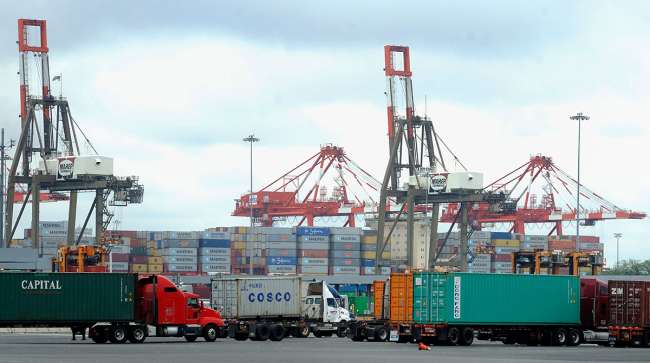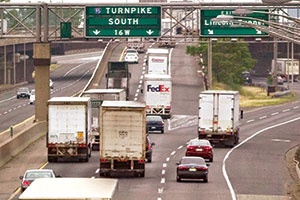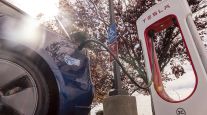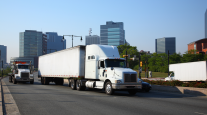NJ Advance Media Group
New Jersey Adopts Clean Truck Rules

[Stay on top of transportation news: Get TTNews in your inbox.]
State Environmental Protection officials adopted Advanced Clean Truck rules Dec. 20 that would make New Jersey the first East Coast state to require phasing in of electric commercial trucks to reduce air pollution and the diseases it causes.
The Advanced Clean Truck rule is modeled after regulations established in California and nearing adoption in several other states. The program is intended to increase the number of electric or zero-emission trucks in the state.
Environmentalists said residents living in some of the state’s poorest communities, who bear the brunt of air pollution and the respiratory diseases it causes, will benefit the most from the new truck rules.
“New Jersey is already experiencing the adverse impacts of climate change, but we have the power and obligation to reduce its worsening in the years ahead by acting now to limit our emissions of climate pollutants,” said DEP Commissioner Shawn M. LaTourette, in a statement.

Trucks and other vehicles travel south bound on the New Jersey Turnpike, in Ridgefield, N.J. (Jin Lee/Bloomberg)
The new rules require each truck manufacturer selling medium- and heavy-duty vehicles in the state to increase the number of electric vehicles sold in the state over time.
Manufacturers get credits by selling Zero Emission Vehicles in New Jersey or can obtain credits from another manufacturer’s sales of ZEVs in the state, DEP officials said.
“It is powerful for the poor communities living near bus depot, airports and ports who live with higher pollution,” said Mary Barber, Environmental Defense Fund state affairs director. “Clean vehicles are an important step to clean air. It reduces the air pollution that harms peoples’ health.”
Barber cited statistics that one in four children in Newark have asthma, which is four times higher than the national average. State Health Department statistics said that residents in four Essex County cities including Newark visit emergency rooms for asthma treatment 150% more than the state average.
“This is a big reason the state needs to push forward on clean trucks,” she said.
Under ACT, deficits that a manufacturer has are based on its total sales of all medium- and heavy-duty vehicles in New Jersey must be offset by credits, beginning in 2025, and credits annually increase through 2035. It is designed to up the total number of zero-emission vehicle sales in the state, officials said.
“It electrifies the dirtiest vehicles on New Jersey roads. These dirty diesel vehicles are especially concentrated near the port and along the turnpike, exposing nearby communities to overwhelming pollution and causing serious health implications,” said Hayley Berliner, Environment New Jersey clean energy advocate.
The rule will “significantly reduce” emissions from the transportation sector, which contributes 41% of the greenhouse gas emissions in New Jersey, said Anjuli Ramos-Busot, Sierra Club New Jersey Chapter Director. The ACT rule will also reduce air pollutants like nitrous oxide and fine particulate matter emissions from diesels, she said.
“If we want to reach our ambitious climate goals and protect public health, we must electrify everything on wheels in New Jersey and the Advanced Clean Truck rule is a critical way to do just that,” Berliner said.
Similar to what manufacturers of passenger vehicles are doing, some established truck manufacturers, such as International, are offering electric-powered models, joining start-ups such a Lion that offer all-electric trucks and buses.

Host Mike Freeze talks to the 2021 Transport Topics Trucking's Frontline Heroes, Gene Woolsey and Cully Frisard. Hear a snippet above, and get the full program by going to RoadSigns.TTNews.com.
However, the Truck and Engine Manufacturers Association voiced opposition to New Jersey officials about ACT in September 2020 that were similar to concerns it raised in California in 2019 that the rules were coming faster than charging infrastructure. The association said the ACT proposal would “put the cart before the horse by mandating manufacturers sell an increasing percentage of zero-emission heavy-duty and medium-duty vehicles without first ensuring that the requisite charging infrastructure and ZEV-purchasing requirements will be in place.”
The association also opposed the regulations based on the higher costs, higher weight than a conventional truck and the lower life of batteries compared to a diesel engine.
Manufacturers couldn’t immediately be reached to comment on New Jersey’s passage of the rule.
The state is providing assistance to help fund the purchase and deployment of electric trucks and buses and to build charging stations. In November, Democratic Gov. Phil Murphy announced a $13.7 million investment in electric buses and trucks to reduce emissions and improve air quality in overburdened communities.
In February, Murphy announced plans to spend $100 million from two pots of environmental money to buy electric buses and trucks. The state also committed nearly $71 million in Regional Greenhouse Gas Initiative proceeds to purchase electric vehicles and install charging stations, DEP officials said.
But relief won’t be immediate because of the size of the fleet to be converted. Just at the Port of Elizabeth and Newark there are 20,000 trucks alone, said Amy Goldsmith, Clean Water Action state director.
“ACT is important because it’s 14 other states. It sends a signal we want electric vehicles, we want them to keep innovating and to bring the cost down and we want to get the infrastructure in place publicly and privately,” she said. “Will it give instant relief? No, and people have to understand that.”
New Jersey just adopted the Advanced Clean Truck rule, becoming just the 4th state in the nation, and the 1st on the East Coast to do so! This rule will slash climate emissions, clean up our air, and make us all healthier. Read our statement: https://t.co/TC428GYOSY — Environment New Jersey (@EnvironmentNJ) December 20, 2021
To give relief to communities that have been overburdened by pollution, Goldsmith and Barber said officials have to make sure those places get the investments first.
“People have to understand that if we’re going to give relief to those disproportionately affected, then the money, the infrastructure needs to be prioritized in these environmental justice communities,” Goldsmith said.
The power grid that will supply electricity also has to be converted from fossil fuels because many power plants also are located in such communities, she said.
“The electric generation can’t be on the backs of environmental justice communities, there are fossil fuel plants in those communities and we have to make the transition as fast and as furious as we can to green energy so we don’t overburden them,” Goldsmith said.
Want more news? Listen to today's daily briefing below or go here for more info:
Distributed by Tribune Content Agency, LLC




